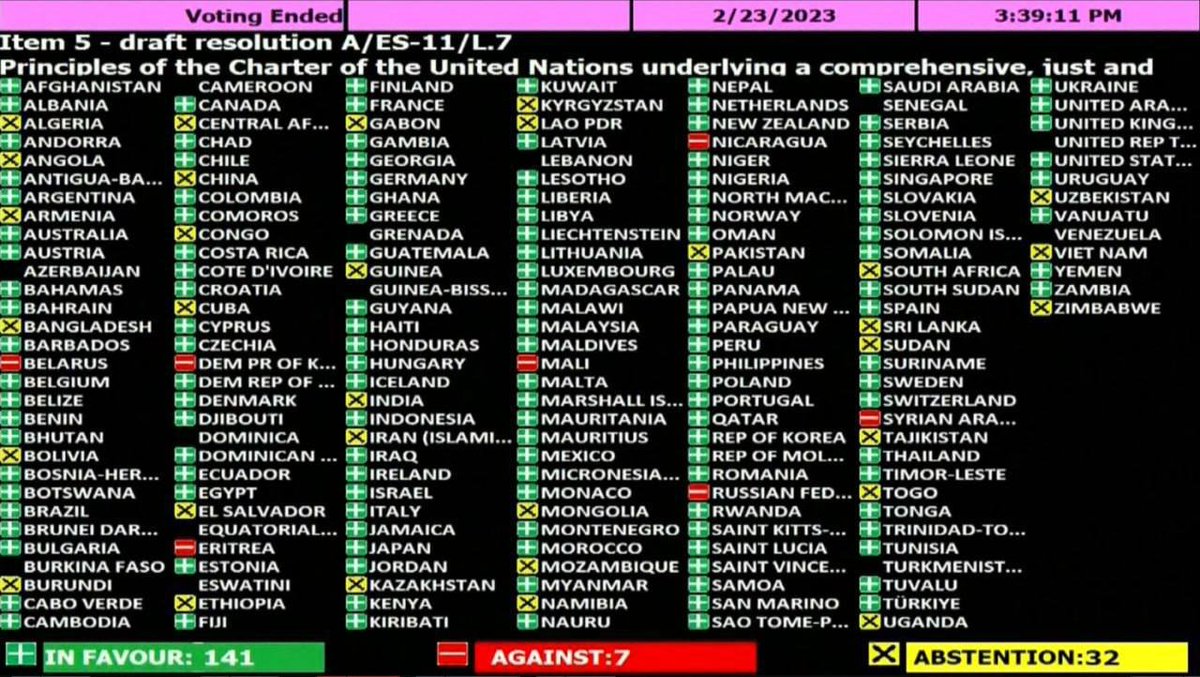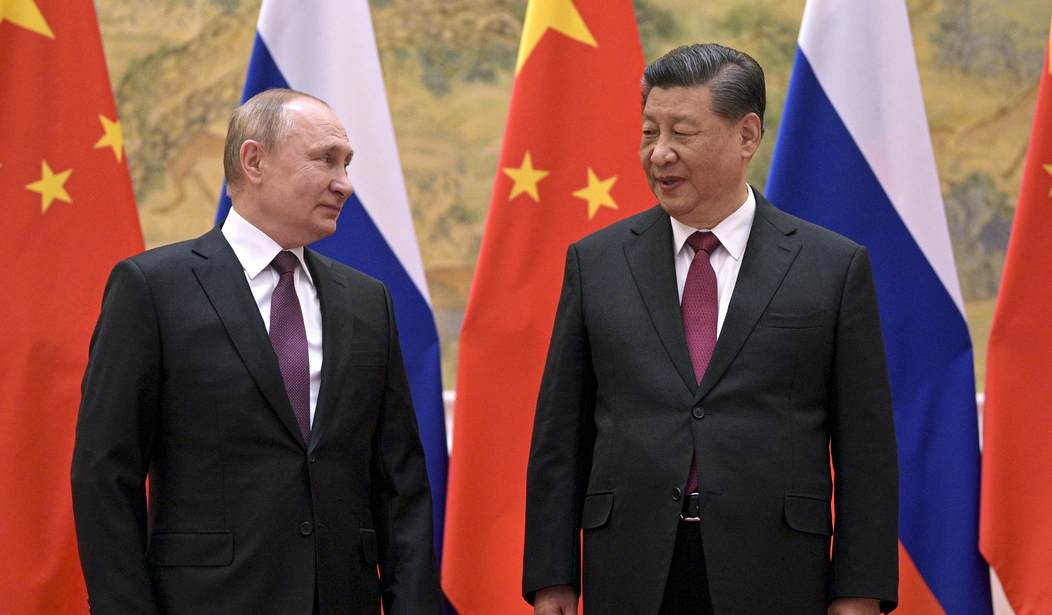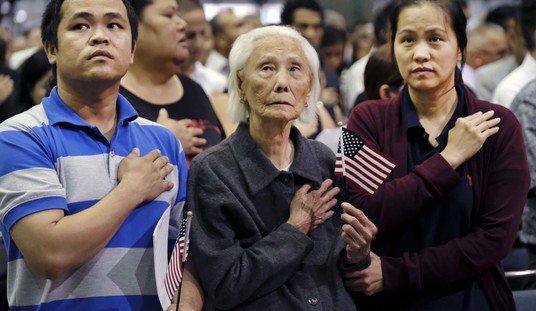Just a day after the Biden intelligence apparatus announced that it would reveal information that China was considering arming Russia, China released its own peace plan for the war in Ukraine.
1. Respecting the sovereignty of all countries. Universally recognized international law, including the purposes and principles of the United Nations Charter, must be strictly observed. The sovereignty, independence and territorial integrity of all countries must be effectively upheld. All countries, big or small, strong or weak, rich or poor, are equal members of the international community. All parties should jointly uphold the basic norms governing international relations and defend international fairness and justice. Equal and uniform application of international law should be promoted, while double standards must be rejected.
2. Abandoning the Cold War mentality. The security of a country should not be pursued at the expense of others. The security of a region should not be achieved by strengthening or expanding military blocs. The legitimate security interests and concerns of all countries must be taken seriously and addressed properly. There is no simple solution to a complex issue. All parties should, following the vision of common, comprehensive, cooperative and sustainable security and bearing in mind the long-term peace and stability of the world, help forge a balanced, effective and sustainable European security architecture. All parties should oppose the pursuit of one’s own security at the cost of others’ security, prevent bloc confrontation, and work together for peace and stability on the Eurasian Continent.
3. Ceasing hostilities. Conflict and war benefit no one. All parties must stay rational and exercise restraint, avoid fanning the flames and aggravating tensions, and prevent the crisis from deteriorating further or even spiraling out of control. All parties should support Russia and Ukraine in working in the same direction and resuming direct dialogue as quickly as possible, so as to gradually deescalate the situation and ultimately reach a comprehensive ceasefire.
4. Resuming peace talks. Dialogue and negotiation are the only viable solution to the Ukraine crisis. All efforts conducive to the peaceful settlement of the crisis must be encouraged and supported. The international community should stay committed to the right approach of promoting talks for peace, help parties to the conflict open the door to a political settlement as soon as possible, and create conditions and platforms for the resumption of negotiation. China will continue to play a constructive role in this regard.
5. Resolving the humanitarian crisis. All measures conducive to easing the humanitarian crisis must be encouraged and supported. Humanitarian operations should follow the principles of neutrality and impartiality, and humanitarian issues should not be politicized. The safety of civilians must be effectively protected, and humanitarian corridors should be set up for the evacuation of civilians from conflict zones. Efforts are needed to increase humanitarian assistance to relevant areas, improve humanitarian conditions, and provide rapid, safe and unimpeded humanitarian access, with a view to preventing a humanitarian crisis on a larger scale. The UN should be supported in playing a coordinating role in channeling humanitarian aid to conflict zones.
6. Protecting civilians and prisoners of war (POWs). Parties to the conflict should strictly abide by international humanitarian law, avoid attacking civilians or civilian facilities, protect women, children and other victims of the conflict, and respect the basic rights of POWs. China supports the exchange of POWs between Russia and Ukraine, and calls on all parties to create more favorable conditions for this purpose.
7. Keeping nuclear power plants safe. China opposes armed attacks against nuclear power plants or other peaceful nuclear facilities, and calls on all parties to comply with international law including the Convention on Nuclear Safety (CNS) and resolutely avoid man-made nuclear accidents. China supports the International Atomic Energy Agency (IAEA) in playing a constructive role in promoting the safety and security of peaceful nuclear facilities.
8. Reducing strategic risks. Nuclear weapons must not be used and nuclear wars must not be fought. The threat or use of nuclear weapons should be opposed. Nuclear proliferation must be prevented and nuclear crisis avoided. China opposes the research, development and use of chemical and biological weapons by any country under any circumstances.
9. Facilitating grain exports. All parties need to implement the Black Sea Grain Initiative signed by Russia, Türkiye, Ukraine and the UN fully and effectively in a balanced manner, and support the UN in playing an important role in this regard. The cooperation initiative on global food security proposed by China provides a feasible solution to the global food crisis.
10. Stopping unilateral sanctions. Unilateral sanctions and maximum pressure cannot solve the issue; they only create new problems. China opposes unilateral sanctions unauthorized by the UN Security Council. Relevant countries should stop abusing unilateral sanctions and “long-arm jurisdiction” against other countries, so as to do their share in deescalating the Ukraine crisis and create conditions for developing countries to grow their economies and better the lives of their people.
11. Keeping industrial and supply chains stable. All parties should earnestly maintain the existing world economic system and oppose using the world economy as a tool or weapon for political purposes. Joint efforts are needed to mitigate the spillovers of the crisis and prevent it from disrupting international cooperation in energy, finance, food trade and transportation and undermining the global economic recovery.
12. Promoting post-conflict reconstruction. The international community needs to take measures to support post-conflict reconstruction in conflict zones. China stands ready to provide assistance and play a constructive role in this endeavor.
This kind of cynical gesture has been the hallmark of Chinese diplomacy since, maybe, the “Warring States” period (475-221 BC). You’ll notice what the proposal doesn’t call for: an end to the war (Item 3 proposes a gradual de-escalation leading “ultimately” to a cease-fire), and it treats Russia and Ukraine as equally responsible for the war when that is not the case.
First and foremost, China is as much a participant in this conflict as NATO. It has foreign policy and prestige interests in Russia emerging as the victor (US Threatens to Release Intelligence Showing China Considering Involvement in Putin’s War in Ukraine). It is also notorious for bootstrapping its own objectives into unrelated agreements. This one is no different.
Item 1 (Respecting the sovereignty of all countries), at first glance, would seem to be a slap at Russia. After all, it is Russia who invaded a neighbor that could not threaten Russia’s borders or territorial integrity. However, what this point hides is a stalking horse for absorbing Taiwan. China sees Taiwan erroneously as a “breakaway province,” and this language, if accepted, would give the stamp of approval to a Chinese attack.
Item 2 (Abandoning the Cold War mentality) is aimed not only at NATO but also at the defensive alliance of the US, South Korea, and Japan, which could be expected to come to Taiwan’s aid if it were invaded.
Item 3 (Resuming peace talks) is sort of bizarre as there have never been “peace talks” to resume. The abortive talks between Ukraine and Russia in Turkey went nowhere because there was no common ground for talks. That situation hasn’t changed. The fact that China doesn’t call for withdrawing Russian forces to the status quo ante as a precondition for talks shows it is not a serious proposal. As no one in Europe trusts China, it is more than a little uncertain how China can “play a constructive role” beyond shutting up and sitting down.
Item 10 (Stopping unilateral sanctions) is about clearing the deck for the Chinese sending lethal aid to Russia. Under current US and EU sanctions, Chinese companies who are found to provide Russia with lethal aid will be penalized. The “long-arm jurisdiction” China refers to is the ability of the Department of Commerce to go to court to levy civil penalties on foreign companies that violate US sanctions. China doesn’t like that because they are a serial violator of sanctions, and without this ability, US sanctions would be useless.
Item 11 (Keeping industrial and supply chains stable), again, is designed to allow Chinese companies to aid Russia without suffering penalties.
This proposal has been condemned by just about all of Europe.
Secretary of State Antony Blinken told ABC News on Friday that it showed China trying to draw the world’s eyes away from its support of Russian President Vladimir Putin.
“China’s been trying to have it both ways — it’s on the one hand trying to present itself publicly as neutral and seeking peace, while at the same time it is talking up Russia’s false narrative about the war,” Blinken said. “There are 12 points in the Chinese plan. If they were serious about the first one, sovereignty, then this war could end tomorrow.”
…
And world leaders are coming out en masse to counter China’s messaging. Beijing’s peace proposal “doesn’t have much credibility because they have not been able to condemn the illegal invasion of Ukraine,” NATO Secretary General Jens Stoltenberg said on Friday. The EU would consider China’s proposals “against the backdrop that China has taken sides,” said European Commission President Ursula von der Leyen. Beijing helped earn that distrust by abstaining from a United Nations’ resolution on Thursday demanding that Russia immediately withdraw from Ukraine.
Ukrainian President Volodymyr Zelensky was more open-minded. But clearly skeptical.
“China started talking about Ukraine, and I think this is a good thing,” Zelensky said at a news conference one year after Russia’s invasion. “But it actually begs the question, what will these words be followed with? The steps next are important.”
…
Speaking from Kyiv, Zelensky said he has plans to meet with Xi. “I … believe this will be beneficial for our countries and for security in the world,” he said.
…
Zelensky said he would “work with China” but only if “there are ideas that correspond to international law or territorial integrity, and some security considerations.”“But it’s something,” he added.
Some, like Carnegie Endowment for International Peace “senior fellow” Alexader Gabuev, says that this is not aimed at Ukraine, per se, but is part of a campaign to raise China’s profile as a voice of reason with the Third World (or “Global South” as the SmartSet™ calls it these days).
China can now market the plan in the global south as proof of Beijing’s dedication to peace and tell the U.S. and its allies “It’s your job to convince the Ukrainians [to stop fighting] — our mission here is accomplished,” Gabuev said.
The document’s publication means “China gets a PR victory upfront without doing anything,” Gabuev said.
This theory looks even more plausible when placed in the context of the UN General Assembly vote calling for Russia to end hostilities and withdraw its military forces from Ukraine.

The vote was 141-7, and the only nations voting against the resolution were Russia’s allies: Belarus, Nicaragua, Russia, Syria, North Korea, Eritrea, and Mali. Venezuela avoided voting because it needs Russian aid, but even Maduro didn’t want the stench of Putin’s War sticking to him.
The real story was in the 32 abstentions. That group includes nations China has been wooing.
I think we can expect to see China send lethal aid to Russia, and we can expect that some minor sanctions will be slapped on minor Chinese companies because, in all seriousness, I think Joe Biden is so compromised by his business dealings with China that he’s afraid to do much more than symbolism.
China is not prepared to be “constructive” in any aspect of resolving the war in Ukraine because it has no interest in doing so. This offer should be viewed as trolling with a hefty dose of poison pills blended in should someone be so stupid as to agree to it.














Join the conversation as a VIP Member